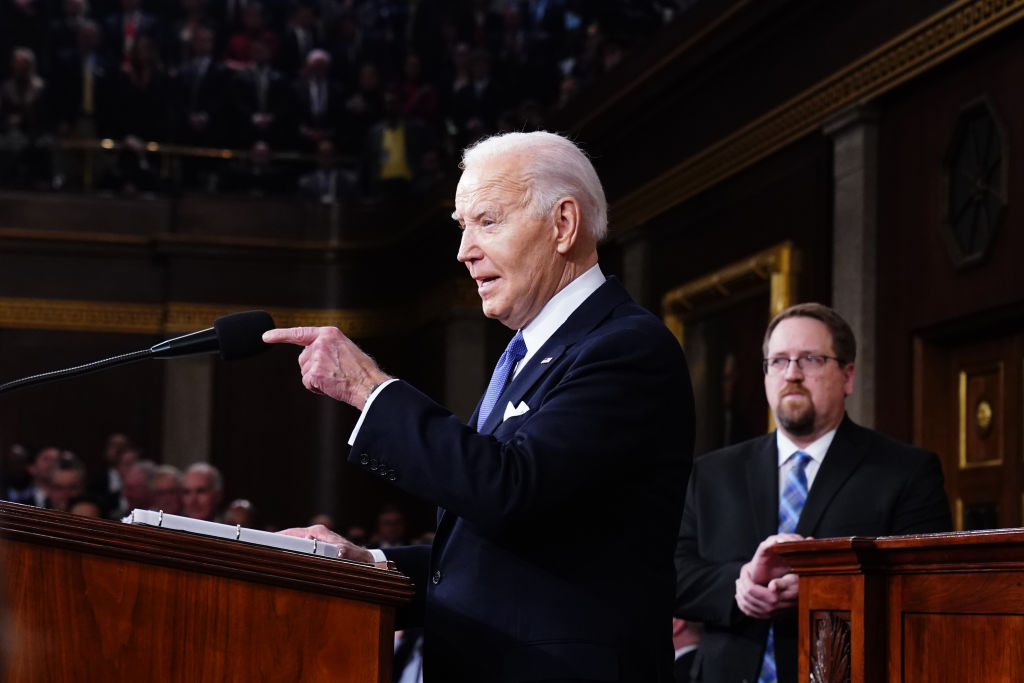If the Joe Biden who showed up to deliver the State of the Union address last week is the Joe Biden who shows up for the rest of the campaign, you’re not going to have any more of those weak-kneed pundits suggesting he’s not up to running for reelection. Here’s hoping he does.
But that’s not the only thing from Thursday night that I hope Biden holds onto. So far, the Biden team has been more sure-footed attacking Donald Trump’s threat to democracy than it has been defending Biden’s incumbency. That reflects a strange problem they face. By virtually any measure save food prices, Biden is presiding over a strong economy — stronger, by far, than most peer countries. As Noah Smith has noted, the Biden economy looks far better than Ronald Reagan’s “Morning in America”: Unemployment is lower, inflation is lower, interest rates are lower, stock market returns are better.
But Americans feel otherwise. The most recent Times/Siena poll found that 74% of registered voters rated the economy either “poor” or “fair.” By a 15-point margin, voters said Trump’s policies helped them personally. By a 25-point margin, they said Biden’s policies hurt them personally.
Voters seem to remember the tail end of Trump’s third year, when the economy was strong, and not the utter calamity of his fourth year, when his COVID response was chaos and the economy was frozen. In November of 2020, unemployment was 6.7% and Trump had just turned a White House celebration into a superspreader event. Republicans who say Americans should ask whether they’re better off than they were four years ago should be careful what they wish for.
American comeback
But Biden is in a tough spot. You don’t want to run for reelection telling voters they’re wrong and the economy is actually great. Nor can you run for reelection telling voters that they’re right and the economy is bad. Biden has often seemed a little unsure what to say about his own record. Thursday night, he figured it out.
“I came to office determined to get us through one of the toughest periods in the nation’s history,” Biden said. “We have. It doesn’t make news, news — in a thousand cities and towns, the American people are writing the greatest comeback story never told.”
Biden’s refrain of the American comeback is a sharp one. It does two things simultaneously. It reminds voters that there is something America is coming back from — namely, the dislocations of the pandemic, and the wild, erratic management style that Trump brought to it — and it lets Biden point to progress without declaring victory. It’s the right message for an incumbent: There are good things happening. Let’s keep going.
It also describes the way the Biden team actually imagines a second term. When I talked to administration officials in the weeks leading up to the State of the Union, I was struck by how many told me that the top priority of a second term was bringing the legislative accomplishments of the first to fruition. Biden’s record is atypically physical: The Infrastructure Investment and Jobs Act, the Inflation Reduction Act and the CHIPS and Science Act are all about building real things in the real world. It’s slow work that takes time — too much time, if we’re being honest.
Wind power is rolling out more sluggishly than the IRA’s authors hoped, and we’re not building new transmission lines at anywhere near the rate necessary to hit the administration’s decarbonization goals. “The biggest barriers to deployment between now and 2030 are non-cost in nature — like siting and permitting delays, backlogged grid interconnect queues, and supply chain challenges,” a recent analysis by the Rhodium Group and Massachusetts Institute of Technology’s Center for Energy and Environmental Policy Research concluded.
Deregulation
Similarly, the advanced semiconductor factories the CHIPS program seeks to build are facing cost overruns and construction delays, and the administration’s efforts to persuade Congress to exempt future plants from environmental review failed.
Related Articles
Trump hints he’s open to Medicare, Social Security cuts
Biden: Netanyahu ‘hurting Israel’ by not preventing more civilian deaths in Gaza
Biden says he regrets using term ‘illegal,’ as Trump hosts Laken Riley’s family at rally
Blow: The war that will haunt Democrats through the campaign
Biden, Trump issue dire warnings of the other, as rematch comes into view in Georgia
Then there’s the part of the economy that still has people furious and is inarguably worse than when Biden took office: prices. Biden announced a number of concrete policies to bring prices down. A temporary tax credit to give Americans mortgage relief while they wait for interest rates to come down. The elimination of title insurance fees on federally backed mortgages. Expanding Medicare’s power to drive down drug prices.
But he could go further. Tyler Cowen, an economist and Bloomberg columnist, is right when he says that the weakness of Biden’s economic agenda has been that it “has a lot of expenditure but very little deregulation.” Even if Biden wins, he’s very likely to face a Republican Senate in 2025. Spending more money will be hard. But the money he’s already spending will go further, faster, if he cuts the red tape that makes it so hard to build homes, roads, factories and energy infrastructure. That requires a deregulatory agenda that can be a tough sell among parts of the Democratic coalition but might, just might, be possible as part of a deal with Republicans.
Biden is practiced at talking about the threat that Trump poses to democracy. It’s clearly what motivates him in this campaign. But he, not Trump, is the incumbent, and Biden has lacked a simple frame to tell the story of his presidency — one that balances what he’s achieved with what Americans still consider undone, and that reminds voters of what he inherited while still laying out a vision for where he’s going.
“Turning setback into comeback,” Biden said Thursday. “That’s what America does.” It’s a good message. And it has the added benefit of being true.
Ezra Klein is a New York Times columnist.


